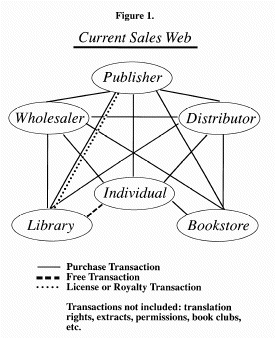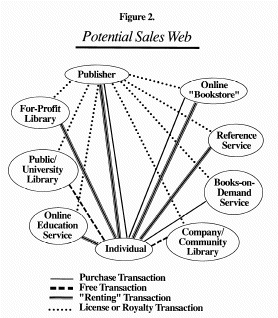
given at the "IEEE Dissemination of Electronic Information Workshop," September 1993.
How many electronic publishers does it take to make a book?
Well--I don't know... what's a book?
I tell that because things are fundamentally changing. Publishing is changing dramatically. The nature of information and information access is changing. What we are doing here today at this symposium is trying to understand what the information environment will be like as this fundamental shift takes place. The IEEE has a motherlode of information--under its aegis a tremendous amount of high-quality information is published. How do you respond to this new, changed society? How will the IEEE be affected by the Information Age? What's the best way to protect the investment you've made in people, in publishing, in information collection and enrichment? How do you make information available electronically and still survive as publishers? How do you charge for stuff in the electronic environment?
I will be talking about all these questions, by way of three principle arenas of discussion: about the changes in our culture, the opportunities that open up in a networked world, and the resulting set of responsibilities that we as nonprofit publishers hold.
I'm also going to posit an approach to electronic publishing uniquely suited to the IEEE, and explain both the practical and personal reasons why the model is worth consideration.
So I've got about thirty minutes of material I'm going to cram into ten minutes.
I'm the Electronic Media Manager at the University of Nebraska Press, one of the ten largest university presses in the country. Though our content differs significantly from yours, we share many similarities. The IEEE's intention in publishing is not to entertain, nor is the University of Nebraska Press's. We both are involved in nonprofit knowledge publishing. Our primary goals are high quality rather than high volume. Our first responsibility is to our specialists, not to our stockholders. And both of us have a great deal of valuable, interrelated information that people want, and are willing to pay for.
My plans for my Press include developing interdisciplinary online information systems that allow the study of the history of the American West in new ways. It uses a variety of pricing models, access models, and ownership models. I'm applying new principles of information to the model I've developed, which I'll be happy to discuss with anyone at any time during the next two days. New approaches are required, because of the essential change in the nature of publishing, when it moves into the realm of electronic access.
For the first time, the mechanisms are available to allow us to send information inexpensively anywhere in the world, and to allow worldwide direct contact by equipped individuals. Publishing's entire framework is shifting, because the unit-based model--the one we've had since Gutenberg--is based on physical creation of an object. In the electronic arena, physical objects don't exist. The repercussions of that simple fact are transformative.
Let me illustrate this graphically with a couple of overheads.


This connectivity makes everything faster, which changes the equation for information access. As an example: it took me a total of about twenty seconds to identify and hook into the IEEE Internet machine, then about twenty minutes of browsing to find what I wanted. Then I e-mailed myself those documents, to read at home, at more leisure, to prepare for this talk. This is staggering. Impossible to believe, five years ago. Difficult to do, two years ago. And now, readers want more.
As nonprofit publishers whose mandate is education, we have a responsibility to give that "more" to our readers. We must acknowledge this change in our responsibilities, and respond to it.
I'm a futurist at heart. Always have been. One of my most-feared distopian futures is one where glazed-eyed screen potatoes are fed edutainment and think they're getting an education. Where the development of problem-solving skill is measured by one's ability to off the most Zarkons while gaining powers in a role-playing online game. Where Time-Warner, Sony, AT&T, and Nintendo Corp. define what information, in what form, we should consider interesting.
I don't want to see that future, and I don't think we have to. So what I'd like to do in the remaining 5 minutes is outline for you a framework for online nonprofit publishing that preserves cost recovery mechanisms, opens up new markets, and also fosters a trend that I hope to see grow: the development of dilettantes as a social force.
If online access to quality information becomes cheap and easy and fun, lots of people will poke around in places outside their normal areas of interest. This opens up new opportunities for the education of our citizenry, and for us as publishers.
The IEEE information is predominantly journals, which have some unique qualities. If a journal is over a year old, it essentially becomes dead wood, except for use as references and archives. Occasionally, the journal may sell reprints of selected articles, but in general, nobody buys back issues of journals. But the digital environment opens up some new possibilities. Older information, if searchable and interconnectable, has a different utility than new information; it's not that it's worthless, but that it's worth less, while still being worthwhile.
The electronic publishing structure I'd like to see the IEEE implement is this: use your old information as a test bed, to tap into new markets, and develop viable online systems at small risk. Sell old information very inexpensively; maintain current pricing models for new information.
For the first year or 18 months after publication, allow access to the electronic versions of your publications only to subscribers to the paper edition. Each is given a password, perhaps, or they have a special client on their machine, or they have a smartcard the reads encrypted data. With any of these techniques, reasonable intellectual property protection is achievable. These tools are available today, with only a small investment.
For the older information, open up your doors. Make it cheap, and accessible to a wide audience.
For most of the IEEE journals, the last five years of documents already exist electronically. That's a treasure trove of information that costs you little to experiment with. Though a few reprint fees may be lost, no subscribers will be replaced. Essentially you have a library waiting to open for new customers. For many of your subscribers, having their archives available and searchable electronically would be a godsend, freeing up a lot of valuable shelf space.
You can even foster new forms of scholarship and new forms of publishing within this resource that you build.
Allow writers and engineers to craft and present new superdocuments within that cheap structure: A tour through the applications of electronmagnetism, for example, using IEEE papers and articles as its base. A guided trip through the point-counterpoints of conflicting theory, following research papers that address a particular problem. A variety of abstracts and synopses, at different knowledge levels. Showcase interdisciplinary applications of basic principles via the broad content in your archives. Allow high-school teachers and university professors to develop curricula within that archive base.
The raw material you have is valuable to far more than just current engineers. It's valuable to scholars, teachers, students, and the average human. I have personal reasons for wanting to see that information available--and not just because I want to be a dilettante.
I've got four children, and what I want for them more than anything--in terms of the information environment--is for them to have no limits on their questioning other than their creativity. One of them plans, as he has said since he was five, to be an inventor. He expects to open "Thor Jensen's Laboratory and Hardware Store," where he can invent things and sell them when he's grown up. His bedtime ritual is to ask me a question about how the mechanics of the world work.
In two years, I want my son to be able to easily peruse every topic of interest to him. He's now seven. Will he understand all the terms used in your journals? Of course not. Will he understand all the explanations? Of course not. But he will learn what he needs to learn, and will learn a tremendous amount via context. Imagine if I could point him to the archives of the last five years of your publications, WAIS indexed, able to do relevance-feedback responses to his general queries.
If I can let him follow his nose into investigations of how the world around him ticks technologically, and be able to find high-quality content from experts and specialists, then I have no doubt that in ten years you'll have a new IEEE member named Thorvald Jensen.
I'd be happy to buy him a junior membership to the IEEE now, if he could search that library of back issues whenever he wanted.
He's only one example of the kind of reader open to you in the networked environment. The rise of the dilettante will be fostered by inexpensive, high-quality information. When search, retrieval, and display technologies are effectively applied inexpensively, I expect to see a much higher percentage of people take to browsing as a sort of intellectual sport. Interdisciplinary studies will increase tremendously, if it's easy to find what you're interested in.
Once you make the IEEE publications of 1987 through 1991 available for browsing and searching, for a small fee, with nothing more than an account name and password required, then you would have a for-fee nonprofit library that served a social good, benefitted the IEEE membership, helped nurture home-grown engineers--future IEEE members--, and stayed financially solvent. By making such a resource available, you'd be a model for other scholarly organizations, societies, and publishers. And by making such a resource available, you'd be positioning yourselves to make the shift from unit-based publishing to resource-based publishing, embracing the inevitable rather than being dragged into the unavoidable.
I ask you as a father to make this available to my son, so that when he's nine he can begin mining your motherlode. I ask you as a futurist to help the online culture be as rich and diverse as possible. And I recommend to you as a publisher to make the most of your opportunity at this unique moment. You've got the content, you've got the resources, you've got access to the tools. Now all you have to have is the will to make it happen.
Thank you.
Back to Michael Jensen's home page